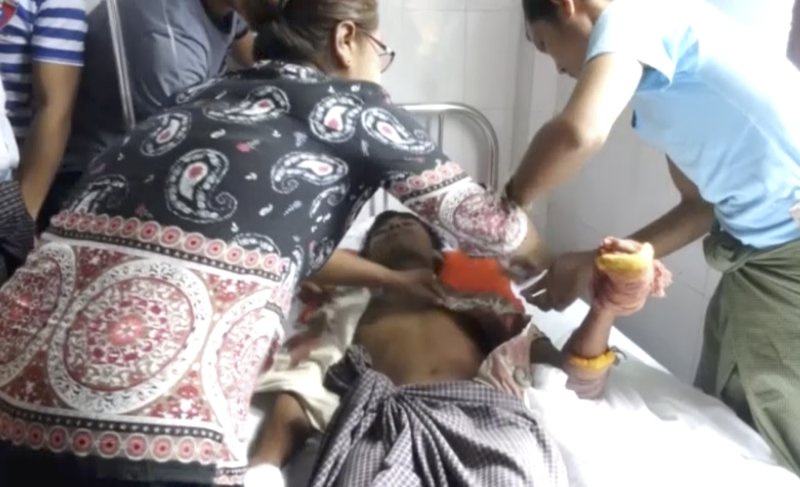COX'S BAZAR, Bangladesh -- Thousands of ethnic Rohingya Muslims were trying to cross from Burma into Bangladesh on Saturday, after an attack by Rohingya militants in western Burma that left 89 people dead in an escalation of communal violence that has plagued the region.
The militants launched the attacks early Friday on more than two dozen police and border outposts. The office of Burma's leader, Aung San Suu Kyi, said military and border police responded to the attacks -- which left 12 security personnel and 77 Rohingya dead -- by launching "clearance operations."
Advocates for the Rohingya on social media have been reporting many army raids on villages, including killings and the burning down of homes. They have also posted videos that they say show villagers who have fled to the mountains for safety.
The accounts, from activists who have given generally reliable information in the past, are impossible to independently verify because the government bars journalists and other outsiders from entering the region without permission.
Mohammad Nur, a Rohingya leader at an unregistered camp in Bangladesh's Cox's Bazar district, said by phone that he had heard that some 100,000 Rohingya had gathered along the border to try to enter Bangladesh, but the number could not be confirmed.
Nurul Kabir, a Rohingya man from Buddhist-majority Burma, said many Rohingya started fleeing their villages after Burmese soldiers and Buddhists started entering their areas.
Kabir said he rescued a 4-year-old boy from a road on his way to the border.
"He was crying, he was alone," he said. "I asked him, 'Where are your parents?' and he was just crying. I took him and brought him with me."
Roshida Khatun, 40, crossed into Bangladesh on Saturday morning along with more than 30 other Rohingya.
Khatun said she left behind her entire family along the border in Burma after she lost track of her whereabouts on Friday night. She said she and hundreds of others started walking to reach the border after her village was attacked by Burmese soldiers.
She reached Amtoli, a border village in Bangladesh's Bandarban district, at about 11 a.m. Bangladesh time Saturday after a nearly 40-hour journey.
"I have left everything behind," Khatun said. "My husband died 11 years ago, and now I have nobody. I have lost my entire family this time."
She said many others were still waiting to enter Bangladesh. "If they are not allowed in, they will die," she said.
Ali Hossain, a top government official in Cox's Bazar, said Friday that authorities were on alert in the wake of the new violence in Burma.
He said that "Bangladesh is already overburdened" and "is unable to take more Rohingya."
"That's the order we have gotten from the Ministry of Home Affairs," Hossain said. "We have done enough and sheltered hundreds of thousands despite our limited resources."
Nur, the Rohingya leader, said Bangladeshi authorities had asked him and his associates to "discourage" their people in Burma from leaving the country.
The U.N.'s International Organization for Migration said recently that about 87,000 Rohingya had crossed the border and entered Bangladesh since October, when a new string of violence broke out in Burma's Rakhine state.
A militant group, the Arakan Rohingya Salvation Army, took responsibility for the Thursday night attacks on more than 25 locations, saying they were in defense of Rohingya communities that had been brutalized by government forces.
Suu Kyi called the attacks "a calculated attempt to undermine the efforts of those seeking to build peace and harmony in Rakhine state."
Burma is often called Myanmar, a name that military authorities adopted in 1989. Suu Kyi and her allies have refused to adopt the name change, as have the United States and Britain.
The U.S. urged authorities to avoid a response to the attacks that would inflame the tensions. State Department spokesman Heather Nauert said the attacks underscored the importance of the government implementing recommendations of a commission chaired by former U.N. chief Kofi Annan, which published its final report on Thursday recommending that the government act quickly to improve economic development and social justice in Rakhine state to resolve violence between Buddhists and the Rohingya.
The clashes were deadlier than an attack by the militants on three border posts in October that killed nine policemen and set off months of brutal counterinsurgency operations by Burmese security forces against Rohingya communities in Rakhine. Human-rights groups accused the army of carrying out abuses including killing, rape and the burning down of more than 1,000 homes and other buildings.
The army's abuses fueled further resentment toward the government among the Muslim Rohingya, most of whom are considered by Burma's Buddhist majority to be illegal aliens from Bangladesh and are denied citizenship and its rights.
A Section on 08/27/2017

